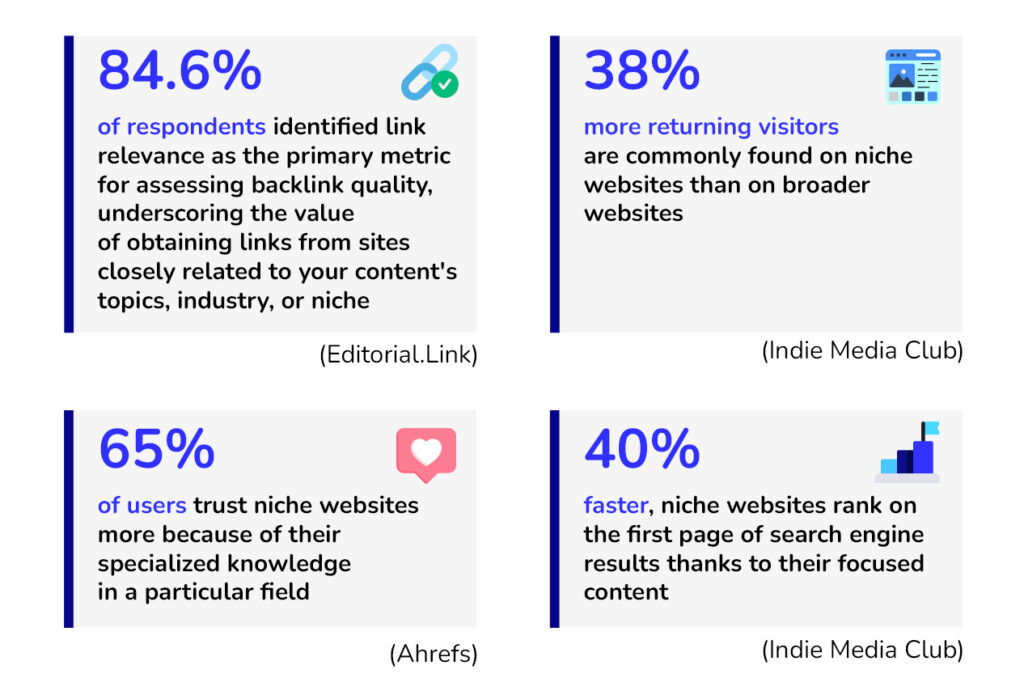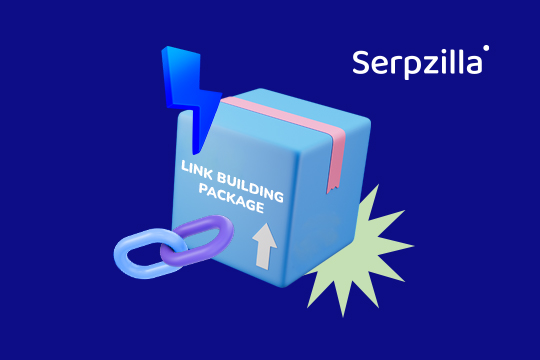Placing backlinks on thematic websites is crucial if you want to increase search engine trust and improve rankings, as such links confirm the relevance of your content. Additionally, backlinks from niche resources attract a new targeted audience, increase traffic and improve the website’s authority, which contributes to its growth in the niche.
In this article, we will talk about how to find your industry websites in Serpzilla, including the available tools and best practices.
Why Placing Backlinks on Niche Websites is Important
Placing links on topic-related websites is an obvious and effective promotion method that ensures maximum relevance and increases the trustworthiness of your resource among a new potential audience.

However, placing links on indirectly relevant websites can also be beneficial and an important part of an overall strategy. If your website’s niche is too narrow, it is not wise to limit yourself solely to it.
For example, if you run a hockey school for children, the best backlinks would come from websites about hockey training or youth hockey leagues. However, such specific resources may be few. In this case, you could target websites about winter sports in general, or websites about children’s activities, where parents might discover your school searching for engaging options for their kids.This will allow you to find more placement opportunities while maintaining a high degree of relevance.
Moreover, many SEO experts believe that placing backlinks not only on thematic websites but also on unrelated sites helps create a diverse and natural backlink profile that appears organic to search engines.
For example, 10–20% of backlinks can come from resources not directly related to your topic, and this is completely normal. To confirm this practice, it is enough to analyze the backlink profiles of successful competitors: most of them have both niche and non-niche backlinks. This proves that this strategy works and brings results.
Backlinks from authoritative sources, such as Wikipedia, prominent news websites, or educational domains (.edu), are also highly valuable. These links improve your website’s credibility, transfer valuable link equity, and contribute to better search engine rankings.
How to Find Thematic Websites in Serpzilla
Serpzilla simplifies the process of finding niche websites since it provides a set of tools designed to identify sites that align closely with your niche. Whether you’re targeting a highly specific audience or exploring related topics, the platform offers flexible solutions to help you find both directly relevant and semi-thematic websites.
The methods for finding niche websites discussed below in the article are suitable for link-building formats such as Niche Edits, Link Insertion, and Guest Posts (the most popular format).
Once you log in to Serpzilla, you’ll find a well-organized dashboard with your project. To proceed to the website search page, you can click ‘Buy links’ → ‘Guest Posts’ → ‘Publisher’s Article’:
You can also select a project from the left-hand menu and then click ‘Buy Backlinks’ → ‘Publisher’s Article’:
You’ll be redirected to the ‘Buy links’ webpage where you can start searching thematic websites.
1. Search by Topic
Serpzilla provides a two-tier catalog of topics with 17 primary categories and 116 subcategories. This feature allows you to narrow your search to specific niches.
Websites are classified into one or more topics using machine learning algorithms. Each site can belong to up to three topics with percentages indicating the degree of relevance to each one.
In the ‘Topic, language and region’ → ‘Topic’ section, select checkboxes next to the relevant topics. You can also use the ‘Search’ field to browse and identify relevant topics quickly.
If your niche is too specific, you can select multiple topics simultaneously to broaden your search. For example, if you are looking for websites related to ‘yoga’, you can also include subcategories like ‘fitness’, ‘wellness’, ‘diets and healthy eating’, or ‘sport’.
With the ‘Relevant to my topic’ feature, you can specify your project’s topic and find relevant websites in just one click. This shortcut simplifies the search process and allows you to quickly focus on the most suitable results.
2. Search by Keywords
If the topic-based search doesn’t provide enough results, you can switch to keyword-based search. This is particularly useful for niches not covered explicitly by the topic catalog.
In the ‘Topic, Language, and Region’ → ‘Keywords’ section, enter keywords relevant to your niche.
If your blog focuses on budget travel tips, you might input keywords like ‘cheap flights’, ‘backpacking Europe’, or ‘budget-friendly travel hacks’. The results could reveal travel forums, budget travel guides, or related blogs that align with your audience and content.
The keyword search feature in Serpzilla offers advanced functionality to ensure thorough and precise results, especially for rental link placements. Unlike traditional searches, which are often limited to homepages, Serpzilla’s system scans all pages across websites offering rental formats.
This means that your search extends to billions of pages, increasing the likelihood of finding highly relevant content and opportunities for placing your link on thematic pages that match your niche.
If you use such a link-building format as Niche Edits (‘Buy links’ → ‘Rental’ → ‘Niche Edits’), Serpzilla additionally supports keyword searches specifically within the Title meta tag. This enables you to locate pages where your chosen keyword appears directly in the title, ensuring an even closer alignment with your desired topic.
For instance, if you search for “yoga for beginners”, the system will prioritize pages with this exact phrase or related variations in their titles, leading to better topic relevance and potentially higher engagement.
3. Search by Smart Topic
Note: This tool is available only for the Niche Edits format.
The Smart Topic feature in Serpzilla streamlines the process of finding thematically relevant pages for link placements. Powered by machine learning, it offers a highly sophisticated method for analyzing and matching content.
First, the system analyzes the content of your website to determine its subject matter. Simultaneously, it evaluates the themes of billions of pages available for placement. By comparing the thematic proximity between your page and potential placement pages, the tool identifies the most relevant matches, ensuring precise and effective results.
In the ‘Smart Topic’ section there are two available search modes:
- By URL: The system will automatically retrieve the content from your project website URL and use it to find pages that are closely aligned thematically. This mode is quick and efficient but may face limitations if the content from the provided URL is inaccessible or insufficient for analysis.
- By Manual Text Input: If URL analysis isn’t possible, you can input the relevant text manually. The system will then use this text as the basis for finding thematically similar pages. This option ensures flexibility and greater control, especially for content that isn’t yet published or requires a more tailored approach.
For example, your yoga studio specializes in postnatal yoga classes, but directly thematic websites are in short supply.
- Using URL Mode:
Provide the URL of your page dedicated to postnatal yoga. Smart Topic analyzes terms like ‘yoga for new mothers’, ‘postpartum fitness’, and ‘gentle exercises for recovery’. It matches pages like parenting blogs discussing postpartum health, fitness websites covering gentle exercises, or forums for new mothers. - Using Manual Text Input:
Input a brief description:
“Postnatal yoga classes designed for new mothers to improve flexibility, reduce stress, and aid recovery after childbirth.”
Smart Topic will locate pages with overlapping themes, such as blogs about motherhood, health tips for new parents, or fitness routines for postpartum recovery.
Tips for Efficient Searching
- Combine topics and keywords
If the niche-based search produces too many results, add relevant keywords to refine your search. This will help you get more precise and targeted results.
Example: Let’s say you’re in the niche of “eco-friendly construction”. A topic-based search for “construction” might return too many broad results, including general websites not directly related to eco-friendly practices. To narrow your search, you could add keywords like “green building” or “eco-friendly materials”. By combining these specific keywords with the broader construction theme, you’ll narrow the results to websites that better match your niche and have more targeted relevance.
- Check the relevance score of websites
Each website in Serpzilla is assigned with a relevance score based on its alignment with your selected theme. Pay attention to these scores to prioritize websites that are more likely to deliver high-quality backlinks and help improve your SEO performance.
- Analyze competitors’ backlinks
By studying the backlink profiles of successful competitors, you can better understand the balance between thematic and non-thematic links they use.
Example: If you’re running a website about “organic skincare”, you can analyze the backlink profiles of top-ranking competitors in the same niche. You might find out that while some of their backlinks come from skincare blogs (niche ones), others come from lifestyle or wellness websites (indirectly relevant). By identifying this balance of thematic and non-thematic links, you can adjust your strategy to include both types of sites.
Conclusion
Serpzilla offers a variety of tools to help you effectively find and target domain websites for your backlink strategy. By combining niche-based and keyword searches, and the Smart Topic tool, you can ensure your backlinks come from high-quality, contextually relevant sources. Whether you’re working with a narrow niche or a broader category, Serpzilla provides the flexibility to refine your search and identify sites that align with your goals.









